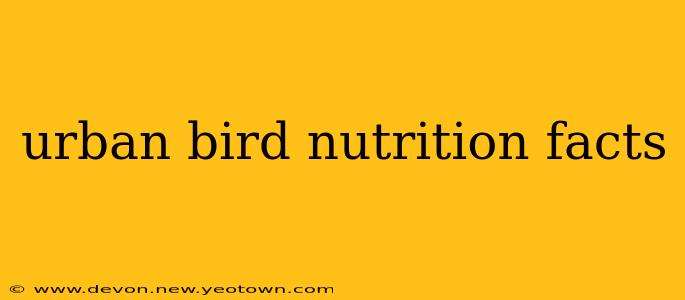The chirping symphony of city birds—a robin's cheerful song, a pigeon's soft coo, a sparrow's insistent chirp—often goes unnoticed amidst the urban cacophony. But have you ever stopped to consider what these feathered friends are eating? Their diets, surprisingly diverse and adaptable, are a fascinating reflection of their urban environment. This isn't just a matter of curiosity; understanding urban bird nutrition is crucial for ensuring their survival and well-being in our increasingly concrete jungles.
What do urban birds eat?
This is a question with a surprisingly wide range of answers! Urban birds are opportunistic feeders, meaning they'll eat whatever's available and accessible. Their diets are often a mix of natural and human-provided food sources. Think of it as a constantly evolving buffet. They might snatch a fallen berry from a park tree one moment, then scavenge crumbs dropped by a hurried passerby the next. Some common food sources include:
- Insects: A staple for many insectivorous birds, from tiny flies to larger beetles. Parks and gardens, even relatively small green spaces, provide a surprising abundance.
- Seeds: A reliable energy source readily available from various plants, including weeds that thrive in urban environments.
- Fruits and Berries: Many birds relish the sweetness of readily available fruits and berries from trees and shrubs, both cultivated and wild.
- Human-provided food: This is where things get interesting! Bread crumbs, scraps from picnics, and even pet food can supplement – or unfortunately, sometimes dominate – a bird's diet. This isn't always beneficial, as we'll explore later.
What are the nutritional needs of urban birds?
Like all animals, birds need a balanced diet to thrive. This includes:
- Protein: Essential for growth, feather maintenance, and reproduction. Insects are a primary source, but seeds also contribute.
- Carbohydrates: Provide energy for flight and other activities. Fruits and seeds are good sources.
- Fats: Crucial for insulation and energy storage, especially important during colder months. Nuts and seeds are rich in fats.
- Vitamins and Minerals: These micronutrients are necessary for various bodily functions. A diverse diet generally ensures adequate intake.
Are there any nutritional deficiencies in urban birds?
Unfortunately, yes. The readily available "junk food" in urban areas can lead to nutritional deficiencies. A diet heavily reliant on bread crumbs, for instance, lacks essential nutrients and can lead to health problems, including:
- Angel Wing: A debilitating condition affecting pigeons, characterized by deformed wings. It's often linked to nutritional deficiencies.
- Obesity: Easy access to high-calorie, low-nutrient foods can lead to obesity, reducing lifespan and making birds more susceptible to disease.
- Impaired immune system: Lack of essential vitamins and minerals weakens the immune system, making birds more vulnerable to illnesses.
What are the consequences of feeding birds the wrong food?
Feeding birds the wrong kind of food, with good intentions, can have unintended and negative consequences. While it might seem like a kind act to share your leftovers, the reality is that this can disrupt their natural foraging behaviors and lead to nutritional imbalances. Avoid feeding birds foods like:
- Processed foods: These often lack essential nutrients and are high in salt and fat.
- Milk: Birds are lactose intolerant.
- Avocado: Contains persin, which is toxic to birds.
- Chocolate: Contains theobromine, which is toxic to birds.
How can I help urban birds get proper nutrition?
You can play a vital role in supporting the nutritional health of urban birds. Instead of providing processed foods, consider these actions:
- Planting native plants: This provides natural food sources like seeds and berries.
- Providing a clean water source: Essential for hydration and bathing.
- Supplying bird feeders with appropriate food: Choose high-quality seed mixes formulated for specific bird species. Avoid feeding bread and other unsuitable foods.
- Educating others: Spread awareness about the importance of proper bird nutrition.
The urban landscape presents both challenges and opportunities for our feathered neighbors. By understanding their nutritional needs and promoting healthy feeding habits, we can help ensure that these vital members of our ecosystems continue to thrive in the city. Their presence enriches our urban spaces, and it's our responsibility to help them flourish.

